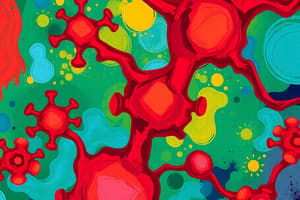Podcast
Questions and Answers
What is the primary action of NSAIDs regarding prostaglandin synthesis?
What is the primary action of NSAIDs regarding prostaglandin synthesis?
- Enhance the synthesis of prostaglandins
- Convert arachidonic acid to thromboxane
- Inhibit the synthesis of prostaglandins (correct)
- Activate the cyclo-oxygenase enzymes
Which COX enzyme is primarily associated with cytoprotective functions in the gastrointestinal tract?
Which COX enzyme is primarily associated with cytoprotective functions in the gastrointestinal tract?
- COX-1 (correct)
- Phospholipase A2
- Thromboxane
- COX-2
Which of the following is a clinical significance of aspirin as an NSAID?
Which of the following is a clinical significance of aspirin as an NSAID?
- It enhances platelet aggregation more than other NSAIDs
- It has a stronger analgesic effect than other NSAIDs
- It provides an antiplatelet effect (correct)
- It has no effect on inflammation
Which of the following actions is NOT associated with NSAIDs?
Which of the following actions is NOT associated with NSAIDs?
What role do macrophages play in relation to NSAIDs?
What role do macrophages play in relation to NSAIDs?
What is the primary therapeutic effect of aspirin that increases with dosage?
What is the primary therapeutic effect of aspirin that increases with dosage?
Which side effect is primarily associated with COX-1 inhibition in the gastrointestinal tract?
Which side effect is primarily associated with COX-1 inhibition in the gastrointestinal tract?
Why are selective COX-2 inhibitors generally preferred for patients with peptic ulcers?
Why are selective COX-2 inhibitors generally preferred for patients with peptic ulcers?
What is a significant cardiovascular risk associated with COX-2 selective inhibitors (Coxibs)?
What is a significant cardiovascular risk associated with COX-2 selective inhibitors (Coxibs)?
Which of the following interventions can reduce the gastrointestinal side effects of NSAIDs?
Which of the following interventions can reduce the gastrointestinal side effects of NSAIDs?
What effect does inhibition of prostaglandins in the kidneys have due to COX inhibition?
What effect does inhibition of prostaglandins in the kidneys have due to COX inhibition?
In comparing COX-1 and COX-2, which statement is true regarding their roles in platelet activity?
In comparing COX-1 and COX-2, which statement is true regarding their roles in platelet activity?
What is the main disadvantage associated with the use of selective COX-2 inhibitors?
What is the main disadvantage associated with the use of selective COX-2 inhibitors?
What effect do COX inhibitors have on the production of prostaglandins that are critical for renal function?
What effect do COX inhibitors have on the production of prostaglandins that are critical for renal function?
What is the consequence of enhanced platelet aggregation due to COX-2 selective inhibitors?
What is the consequence of enhanced platelet aggregation due to COX-2 selective inhibitors?
Flashcards
How do NSAIDs work?
How do NSAIDs work?
The enzyme Cyclooxygenase (COX) helps create prostaglandins (important for various bodily functions). NSAIDs like aspirin block COX, preventing the production of prostaglandins. This reduces inflammation, pain, and fever.
What are the main effects of NSAIDs?
What are the main effects of NSAIDs?
NSAIDs show analgesic, antipyretic, and anti-inflammatory effects. These effects result from their ability to block COX and reduce prostaglandin production, which are involved in pain, fever, and inflammation.
Compare COX-1 and COX-2 roles
Compare COX-1 and COX-2 roles
COX-1 is crucial for protecting the stomach lining and regulating blood clotting. COX-2 primarily contributes to inflammation. NSAIDs that block both COX-1 and COX-2 can lead to unwanted side effects like stomach ulcers and bleeding.
Why is aspirin the preferred antiplatelet NSAID?
Why is aspirin the preferred antiplatelet NSAID?
Signup and view all the flashcards
How do NSAIDs reduce inflammation?
How do NSAIDs reduce inflammation?
Signup and view all the flashcards
Selective COX-1 Inhibitors
Selective COX-1 Inhibitors
Signup and view all the flashcards
Non-selective NSAID
Non-selective NSAID
Signup and view all the flashcards
Selective COX-2 Inhibitors
Selective COX-2 Inhibitors
Signup and view all the flashcards
Prostaglandins and COX Enzymes
Prostaglandins and COX Enzymes
Signup and view all the flashcards
Peptic Ulcer and GI Bleeding
Peptic Ulcer and GI Bleeding
Signup and view all the flashcards
Renal Dysfunction
Renal Dysfunction
Signup and view all the flashcards
Cardiovascular Risk
Cardiovascular Risk
Signup and view all the flashcards
Main Side Effect of NSAIDs
Main Side Effect of NSAIDs
Signup and view all the flashcards
Reducing NSAID Side Effects on GIT
Reducing NSAID Side Effects on GIT
Signup and view all the flashcards
COX-2 Selective Inhibitors (Coxibs)
COX-2 Selective Inhibitors (Coxibs)
Signup and view all the flashcards
Study Notes
Non-Steroidal Anti-inflammatory Drugs (NSAIDs)
- NSAIDs are cyclo-oxygenase inhibitors, preventing the synthesis of prostaglandins.
- These drugs have analgesic effects (relieve pain), antipyretic actions (lower body temperature), anti-inflammatory roles (reduce inflammation/swelling), and antiplatelet actions (decrease platelet aggregation, inhibiting thrombus formation) in some cases.
Synthesis of Prostaglandins
- Prostaglandins are synthesized from arachidonic acid via cyclooxygenase (COX) enzymes (COX-1 and COX-2).
- Phospholipase A2 initial enzyme in the process.
- COX-1 is constitutively expressed (always present), playing a role in housekeeping functions like protecting the stomach lining and regulating kidney function.
- COX-2 is inducible, increasing in response to inflammation.
Role of Cyclooxygenases (COX)
- COX-1 is responsible for producing prostaglandins involved in protecting the stomach and kidneys and in blood clotting.
- COX-2 is involved in inflammation, pain, and fever.
Classification of COX Inhibitors
- COX-2 selective inhibitors (e.g., celecoxib): associated with a reduced risk of gastrointestinal side effects but an increased risk of cardiovascular events.
- Semi-selective inhibitors (e.g., meloxicam, ibuprofen): fall between the two categories in terms of selectivity and associated risks.
- Nonselective inhibitors (e.g., aspirin): are associated with a higher risk of gastrointestinal side effects and lower risk of cardiovascular events.
Effect of NSAIDs
- NSAIDs inhibit COX-1 and COX-2, impacting prostaglandin production, resulting in anti-inflammatory, analgesic, and antipyretic effects.
- NSAIDs also impact platelets, reducing aggregation and thrombus formation.
- They work by resetting the hypothalamic thermostat to reduce fever but don't reduce heat production causing fever.
Advantage of NSAIDs
- NSAIDs reduce inflammation, pain, and fever
- They reduce blood clots, reducing risks from strokes
Side Effects of COX-1 Inhibitors
- Gastrointestinal (GI) problems: increased risk of peptic ulcers and bleeding due to reduced protective prostaglandins.
Side Effects of COX-2 Inhibitors
- Potential cardiovascular risks (e.g., heart attack, stroke)
Effect of Selective COX-2 Inhibitors
- Selective COX-2 inhibitors primarily target COX-2 and have shown less gastrointestinal side effects compared to non-selective ones..
Selective COX-2 Inhibition & Enhanced CV Risk
- Inhibition of vasodilatory prostaglandins (PGI2) and unopposed activity of platelet-derived TXA2 leads to increased cardiovascular risk.
Side Effects of NSAIDs
- GI effects like ulcers and bleeding
- Kidney effects like fluid retention and increased blood pressure.
NSAIDs During Pregnancy
- NSAIDs are often contraindicated during pregnancy except for low-dose aspirin..
Acetaminophen
- Acetaminophen acts primarily on COX-3 and is used as an analgesic and antipyretic.
- It has minimal anti-inflammatory effects
- At high doses, it can cause liver damage.
Studying That Suits You
Use AI to generate personalized quizzes and flashcards to suit your learning preferences.
Related Documents
Description
This quiz covers the pharmacological aspects of non-steroidal anti-inflammatory drugs (NSAIDs) and their mechanism of action, particularly focusing on the synthesis of prostaglandins via cyclooxygenase (COX) enzymes. Explore the roles of COX-1 and COX-2 enzymes in drug effects and physiological functions. Test your knowledge on these essential concepts in pharmacology.



